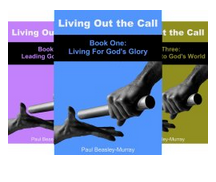Living out the Call
Paul Beasley-Murray's four-volume guide for pastors draws on the author’s 43-year career in ministry, much of it spent turning around two declining churches and developing them into the vibrant congregations they are today
 Living out the Call
Living out the Call
By Paul Beasley-Murray
Four volumes available on Kindle from Amazon
Reviewed by Paul Goodliff
Paul Beasley-Murray describes this book as ‘clear, passionate and straightforward’, and the evidence for this on almost every page. Reading it suggests that here is someone who approaches the practice of ministry, not from a position of cool objectivity, but passionate commitment and love for the One whom ministers serve.
Having affirmed its warm-heartedness, however, I must also commend its scope and its intellectual vigour. Readers looking for a gentle canter through a ‘how-to’ guide to ministry, beware. This is a demanding book, but not so much intellectually so (Beasley-Murray’s style ensures this is not an unnecessarily academic book, despite its origins, in part, in an MA course on ministry) but demanding of the soul, of the heart. It comes with that Spirit-anointed challenge to review one’s own practice again and offer ‘my utmost for his highest’ (to echo Oswald Chambers memorable phrase.)
Arising out of a long and distinguished ministry of leading two churches, separated by a period as Principal of Spurgeon’s College (full disclosure: Paul was my Principal when I trained at Spurgeon’s, and remains a dear friend and collaborator), the book began its life as a shorter work, A Call to Excellence, published in 1995.
Much of the structure and concerns of that earlier book remain, but now expanded and given both a rather more academic tone, and the benefit of Beasley-Murray’s final, and long pastorate at what was Victoria Road South Baptist Church, Chelmsford. This was transformed and ‘re-clothed’ in a redeveloped building into Central Baptist Church under his ministry. It remains one of the most vibrant and successful examples of a town centre church (a species of church that is prone to damaging decline elsewhere). The same passionate commitment to ministry evident in that church is expressed in every page of this book.
Available only ‘on-line’ as an ebook, it is divided into four volumes: Living for God’s Glory (professionalism and spirituality); Leading God’s People; Reaching out to God’s World; and Serving God’s People.
Living for God’s Glory
One of the more contentious parts of these books will be the section on professionalism. Beasley-Murray is well aware of this, but remains adamant that, properly understood, ministry must be professional. At its heart is a desire to offer one’s best to God and Christ’s church.
Since this part comes early on, some might be tempted to exit the book at this point, and that would be tragic. Persevere, and the riches that follow will reward pressing through the challenging call to professional ministry.
What follows, being an exemplary pilgrim, explores the spiritual life of the minister, and I must commend what Beasley-Murray discusses. Here is a shape to the minister’s personal life that all would do well to pay close attention to, and I found myself offering a silent ‘amen’ on every page. Curiously for one so reluctant to conceive of ministry in sacramental terms, the spirituality adhered to is surprisingly ‘Catholic’, comprising, for instance, the use of a lectionary for daily readings, spiritual direction and regular retreats.
This section also explores the demands of success and failure, although greater clarity would be helpful when Beasley-Murray is expressing the opinions of those of whom he is critical, and might avoid some disconcerting observations such as ‘A ‘successful pastor is a pastor of a bigger and better church’. It is clear later that he believes none of that, and knowing him, I can hear Beasley-Murray say it with a tone that is entirely ironic, but the written word does not convey such nuances.
However, what follows is entirely accurate: any worldly pursuit of success is to be avoided, but faithfulness is the correct aim. A long section on ministerial vices and sins is salutary, and a closing section (fittingly) on retirement has much wisdom within it, from the perspective of on who has stepped down from pastoral charge of a congregation, and lives life at a different pace (allegedly!)
Leading God's People
The second volume develops the ideas of leadership, team ministry and management. Much will be familiar, but it is helpful to see these matters expressed with clarity, even if I take a rather more sceptical view of the benefits of some management theory as applied to the practice of ministry. Beasley-Murray is very clearly in the leader mould, and that sometimes causes some to find his style of ministry challenging, but there is no doubt that whatever the tone, the church is in need of godly and visionary leadership. This volume will assist many to evaluate and adjust their leadership I hope, not least his absolute commitment to the leadership of women (pp.11-12.) He contends that New Testament Leadership is always shared, non-coercive, relational and accountable.
All I will say about Beasley-Murray’s second half of volume one on team ministry is that every team minister should read this urgently, and in my (perhaps limited) experience, this is by far the best exposition and guidance on team ministry I know. I am not surprised, since one member of Beasley-Murray’s former team at Chelmsford was very enthusiastic about his team leadership in a personal conversation with me. There is much else besides in this comprehensive book that deserves wide readership.
Reaching out to God’s World
Volume 3 is devoted to preaching and mission. The exposition of these aspects of ministry is expansive, and both could be books in their own right. Beasley-Murray remains a critical friend to church growth, and sees the minister’s role as a mission strategist rather than the primary agent of doing missionary activity. There is much that will be familiar, but in its scope it is helpful.
Serving God’s People
Volume 4 brings the book to a triumphant close with two themes: the minister as creative liturgist and compassionate pastor. Pastors have overall responsibility for worship? Yes (amen!) Pastors need to become creative liturgists? Yes (amen to that too!) The Lord’s Supper at the centre of worship? Yes. (amen too) I found myself once again silently ‘shouting’ yes to everything that is an urgent counter to so much in contemporary worship that is shallow, derivative and dull. In addition there is much imaginative material on the rites of passage and occasional offices that I shall refer to again and again now that I too have returned to pastoral charge of a congregation. Thank you Paul!
 If there were just one thing to repeat from the final section, on pastoral care, it would be p. 60, (despite the typos in the original!) ‘Pastors need to get out of their offices and be where their people are.’ But there is so much else besides, including welcoming the newcomer, caring for children and the non-conformers, all of whom are not central to much else written in the field of pastoral care (with notable exceptions) I also cheered when Beasley-Murray narrated the story of Central Baptist Chelmsford’s growth towards being a church where gay and lesbian people might find a welcome, even if most of the members remained convinced, as the majority of Baptists throughout the Baptist Union do, that there is something inherently sinful about that kind of sexual union.
If there were just one thing to repeat from the final section, on pastoral care, it would be p. 60, (despite the typos in the original!) ‘Pastors need to get out of their offices and be where their people are.’ But there is so much else besides, including welcoming the newcomer, caring for children and the non-conformers, all of whom are not central to much else written in the field of pastoral care (with notable exceptions) I also cheered when Beasley-Murray narrated the story of Central Baptist Chelmsford’s growth towards being a church where gay and lesbian people might find a welcome, even if most of the members remained convinced, as the majority of Baptists throughout the Baptist Union do, that there is something inherently sinful about that kind of sexual union.
Many of the examples to illustrate his points are derived from his own ministry, and the Chelmsford pastorate especially, but there is also a very welcome international flavour, with New Zealand Baptists playing a prominent role here. If I were to be critical at all at this point, it would be to say that rather too much material comes out of Beasley-Murray’s own ministry, and at times the structure draws too heavily on previously published material stitched into the argument, but since most readers will not have that available to them except in its current form, and as this book has the flavour of a ‘final word’ on the theme (although I hope and anticipate that we shall see much more from Beasley-Murray’s pen before the final word becomes truly final!) this tendency can be excused.
The passionate commitment sometimes leads to hyperbole and perhaps an over-stating of the matter. So, on page 11 of Vol. 1 speaking of the call, Beasley-Murray states he was ‘accountable to God and to God alone.’ I am sure that he was accountable also to Church Meeting, as every other Baptist Christian is, (in fact on p.18 of Vol. 2 he explicitly states ‘Leaders are always accountable to the church,’) but I guess we know what he is wanting to secure: the freedom of the minister from undue ‘ownership’ by the diaconate. Every minister is accountable to God, the question is, how is that fleshed out? Beasley-Murray answers this question quite specifically in pp. 38ff, ‘Pastors need to be accountable,’ where it becomes clear that he has been one of the most accountable ministers I know, through appraisals and supervision amongst other means. Perhaps a second edition might bring greater consistency to issues like that, but, I hope, without losing the ‘Beasley-Murray style’, which, love it or hate it, is distinct and very personal.
'...if you are a Baptist minister, you cannot afford not to get your copy'
Beasley-Murray and I differ quite significantly over the significance of ordination, and whether ministry is primarily a functional descriptor of leadership, but I share without demur his five commitments to ministry on p.15 ff. in Vol. 1. That remains the strength of this four volume work: you might disagree over points, but I cannot but find myself applauding most of what Beasley-Murray writes, and if there was a gap in the market for a thorough exploration and exposition of ministry in its traditional form, then it has been splendidly filled by this, Beasley-Murray’s crowning achievement to the contribution he has made over a life-time’s ministry through the written word.
Should you buy it? At the extraordinarily good value it represents (where else can you buy a 400 page book for under ten pounds) and moreover, with the wealth of wisdom it incorporates, I suggest that if you are a Baptist minister, you cannot afford not to get your copy. Whether you love him or, (as not a few seem to do,) struggle with him, you cannot ignore that this is one of the best books on ministry available today.
I am, of course, shamefully green with envy: it is just the book I wish I might write, and my ministry will be the richer and more faithful, pray God, for reading it. You don’t need to sell your shirt to get this book: just a couple of pairs of socks, so…. For goodness sake get your hands on your copy now. After all, it will never be seen in a second-hand book shop, so there’s no point in waiting.
The Revd Dr Paul Goodliff is a minister at Abingdon Baptist Church, and Visiting Lecturer, Bristol Baptist College and University of Roehampton
Baptist Times, 18/12/2015